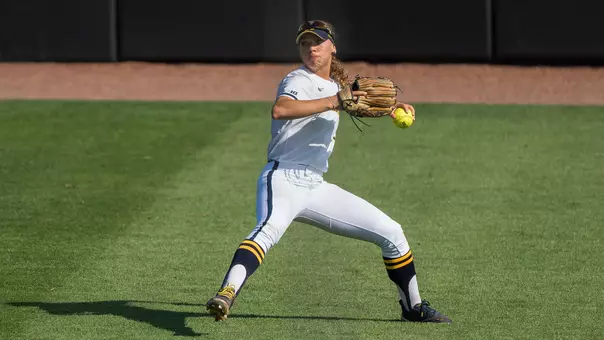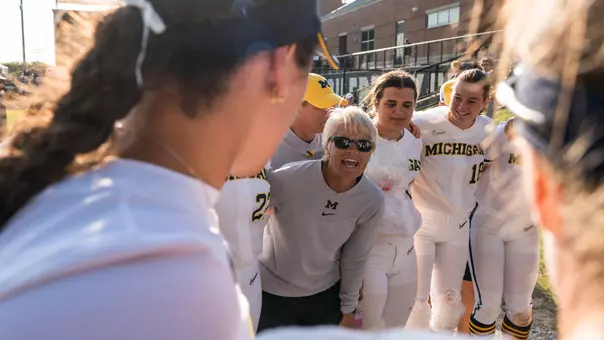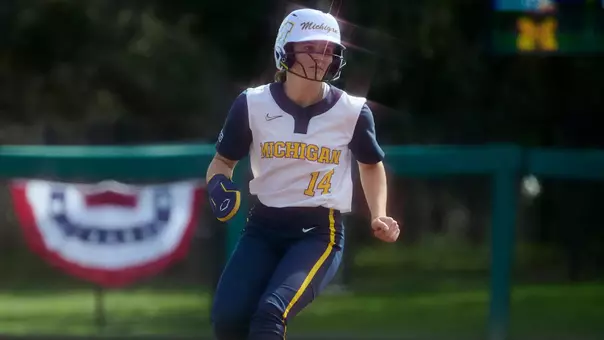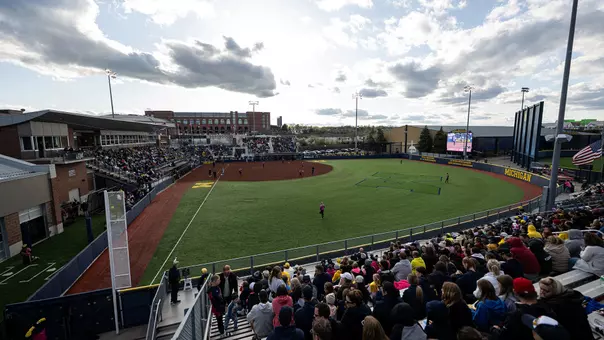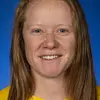
Scholar Stories: Livingston Applies Movement Science to Athletic, Academic Success
5/4/2023 10:00:00 AM | Softball, Features
Continuing the series that began in 2016-17, each Wednesday MGoBlue.com will highlight a Michigan student-athlete and their academic pursuits. These are our Scholar-Athlete Stories, presented by Absopure.
By Sam Gold
Graduate student utility player Melina Livingston has spent the last two seasons refining her passion for the intersection of sports and the science of movement. Now she is poised to bring it to a broader community.
Livingston earned her bachelor's degree in Kinesiology in 2021 from Penn State's College of Health and Human Development. As part of the Kinesiology program, Livingston participated in approximately 300 hours of field work, which included shadowing a physical therapist. She fell in love with learning about the processes behind helping patients recover from injuries, but she wanted more than the limited interaction she had with them.
"You see a patient for an hour and then you don't see them for the rest of the week and you kind of hope that they go home and do their physical therapy homework," she said. "They would come back to the next meeting and say, 'Yeah, I didn't really do my homework and I'm still not feeling okay.'"
Realizing that physical therapy was not as fulfilling as she had anticipated, Livingston graduated from Penn State not sure what she wanted to do.
"I still really enjoyed what I was learning," she said. "Then that took me to Michigan, thinking 'Let's just keep learning, let's see what's out there.' Luckily, I had another year of eligibility, so I kind of tied softball in with the movement science program here."
At Michigan, Livingston has built on her background in Kinesiology by pursuing a master's degree in movement science through the Rackham Graduate School. The program features many facets of movement-related studies, including exercise physiology, motor control and development and biomechanics. The program also prides itself in its flexibility in course selection and research areas, which allow students like Livingston to fuse her love for sports and experiences as a student-athlete with her interest in movement science.
Livingston credits one of her professors for helping to spark her interest in orthotics and prosthetics.
"I have a professor who is kind of a mentor of mine here," she said, "and she is a certified orthotist and prosthetist and basically fits people for orthotics and prosthetics. With that, you make sure these items are able to fit all of these different people for their different activities. You might help a kid who wants to be more active by giving him this kind of brace, or simply if a kid wants to be able to hang around and keep up with his friends.
"Something I'm super passionate about is trying to make sports as inclusive as possible, so I really want to help people compete in team sports with adaptive devices."
After two schools, two degrees and many years of unraveling her relationship between movement science and sports, Livingston is planning to attend her third Big Ten school next fall. She recently was accepted to study orthotics and prosthetics at Northwestern in the Master's in Prosthetics-Orthotics program, extending the work she was first introduced to at Michigan.
Livingston has been a lifelong athlete. Whether it was for softball, basketball, soccer, flag football, or even swimming -- where she had the guidance of her mother, Deanna, who was a collegiate swimmer at Oakland University -- Livingston has always been cognizant of the importance of maintaining a healthy body to be successful as an athlete.

"I really enjoy studying how the body moves and I knew that in high school," she said. "I was doing a lot of training with physical therapists, doing a lot of training with myself, with strength and conditioning to play softball. I really liked that environment, so I figured maybe this is something I want to go into. I really fell in love with thinking, 'How can I get myself, through my learning, to be able to excel in softball?'"
That is exactly what she has done. In 106 games at Penn State as an undergraduate, Livingston posted a .293 batting average over her three seasons, including a single-season best of .310 as a freshman, and was the Nittany Lions' leading hitter in 2021. She transferred her success to Michigan's softball team starting last year and earned 2022 All-Big Ten second team honors.
Livingston has been a Swiss Army knife throughout her softball career, playing second base, third base and first base at Michigan. Although she's played primarily first base for the Wolverines this year, Livingston is simply happy to be on the field and contribute.
"I just enjoy being on the field with my teammates," she said, "so I genuinely couldn't tell you what my favorite position is. I've always been a kid that moves around the field my whole life, so it's pretty normal for me. I like hitting if that helps."
This season, Livingston is one of two captains for the Wolverines, a role she is hoping she can learn from and apply to her future career.
"I'm shifting into more of a leadership role this year and I've learned a lot," she said. "Just learning how to communicate and finding ways to motivate different people is a learning curve. But I think that something that I am going to be able to take into the real world with me is that not everybody grew up the exact same way I did. So being able to communicate with people who learn differently and who are motivated by different things is going to be super beneficial."
Coming home to Michigan felt like the perfect fit for Livingston. She grew up in Harrison Township, Mich., as a Wolverine fan, attending football games before she could remember. Now, as a 2023 graduate student armed with her master's degree, Livingston is excited to apply her experiences in team sports and education back to Michigan and the Ann Arbor community. She has been inspired by the adaptive athletics programs available in Ann Arbor and is ready to get involved.
"I've learned so much from being in team sports with softball and all the things that I've gotten to experience," she said, "and I think that there's so many personality traits in all of that that you can learn from sports that people don't really get to experience as often because they don't get to participate in normal sports at their school.
"Getting kids, teenagers, people, in team sports to help them develop -- and maybe they don't want to be competitive and they just want to be in a community -- is awesome. I think being able to give people that community is awesome."

